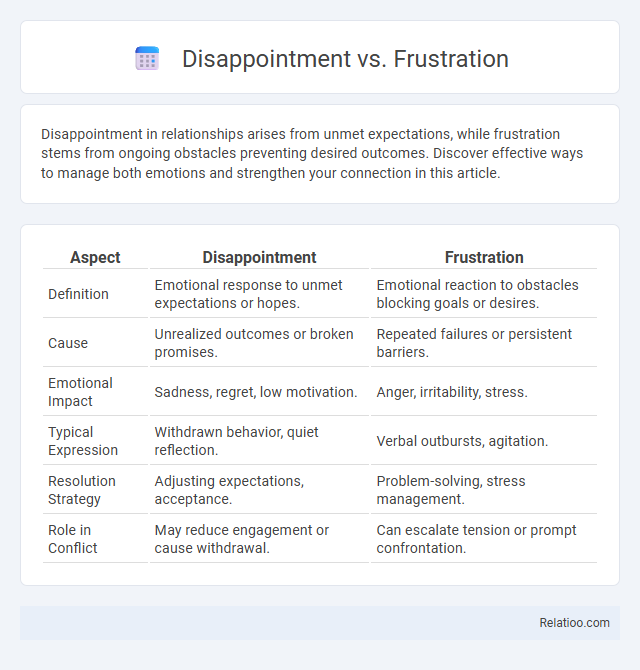Disappointment in relationships arises from unmet expectations, while frustration stems from ongoing obstacles preventing desired outcomes. Discover effective ways to manage both emotions and strengthen your connection in this article.
Table of Comparison
| Aspect | Disappointment | Frustration |
|---|---|---|
| Definition | Emotional response to unmet expectations or hopes. | Emotional reaction to obstacles blocking goals or desires. |
| Cause | Unrealized outcomes or broken promises. | Repeated failures or persistent barriers. |
| Emotional Impact | Sadness, regret, low motivation. | Anger, irritability, stress. |
| Typical Expression | Withdrawn behavior, quiet reflection. | Verbal outbursts, agitation. |
| Resolution Strategy | Adjusting expectations, acceptance. | Problem-solving, stress management. |
| Role in Conflict | May reduce engagement or cause withdrawal. | Can escalate tension or prompt confrontation. |
Understanding Disappointment and Frustration
Disappointment arises from unmet expectations, often linked to specific outcomes or events that fail to align with hopes or desires, causing feelings of sadness and regret. Frustration occurs when obstacles block progress toward a goal, leading to irritation and stress due to perceived lack of control or repeated failure. Understanding the distinction involves recognizing disappointment as an emotional response to external results, while frustration is tied to internal struggles with barriers and unmet needs.
Key Differences Between Disappointment and Frustration
Disappointment arises from unmet expectations or outcomes falling short of hopes, often leading to sadness or regret, while frustration stems from obstacles or repeated failures blocking goal achievement, triggering irritation or anger. Disappointment typically involves processing a situation's emotional impact, whereas frustration involves active responses to external challenges or internal resistance. Understanding these key differences helps in managing emotional reactions effectively, promoting healthier coping strategies tailored to each experience.
Common Causes of Disappointment
Common causes of disappointment often include unmet expectations, broken promises, and personal failures. Unrealistic goals and reliance on external validation also frequently contribute to feelings of disappointment. Understanding these triggers can help differentiate disappointment from frustration and regret by focusing on emotional responses tied to specific situations.
Typical Triggers for Frustration
Typical triggers for frustration include obstructed goals, repeated failures, and lack of control over situations, often causing emotional tension when expectations are unmet. Frustration emerges from external barriers such as delays, inefficiencies, or interpersonal conflicts that hinder progress. Unlike disappointment, which relates to unmet expectations, frustration specifically involves active resistance or challenges in achieving desired outcomes.
Psychological Impact of Disappointment
Disappointment triggers a distinct psychological impact characterized by feelings of sadness and lowered self-esteem, often stemming from unmet expectations and the resulting cognitive dissonance. Unlike frustration, which induces stress and agitation due to obstacles blocking goals, disappointment leads to a more reflective emotional state that can affect motivation and mental well-being over time. Understanding this nuanced emotional response is critical for developing coping strategies that mitigate long-term negative effects on psychological health.
Emotional Effects of Frustration
Frustration triggers intense emotional effects such as irritability, stress, and a sense of helplessness, often arising when your goals or desires face obstacles. Unlike disappointment, which centers on unmet expectations, frustration involves an active struggle against impediments, leading to heightened anxiety and reduced motivation. Understanding these emotional nuances helps manage your reactions and develop better coping strategies.
How to Cope With Disappointment
Coping with disappointment involves acknowledging your feelings and allowing yourself time to process the setback without self-judgment. Identify the source of your disappointment and reframe the experience by focusing on lessons learned and potential growth opportunities. Practicing mindfulness and seeking support from trusted individuals can help you regain perspective and develop resilience during challenging moments.
Effective Strategies to Overcome Frustration
Frustration arises from obstacles hindering goal achievement, often leading to negative emotions that impair decision-making and motivation. Effective strategies to overcome frustration include mindfulness techniques to increase emotional awareness, cognitive restructuring to challenge unhelpful thoughts, and problem-solving skills to identify actionable steps toward resolution. Regular physical activity and social support also play critical roles in reducing stress and enhancing resilience against persistent frustration.
Turning Disappointment and Frustration Into Growth
Disappointment and frustration both arise from unmet expectations but differ in intensity and emotional focus, with disappointment linked to sadness and frustration tied to anger. Turning these emotions into growth involves reframing setbacks as learning opportunities, fostering resilience, and developing problem-solving skills. Embracing this mindset promotes emotional intelligence and accelerates personal development, transforming negative experiences into catalysts for success.
Choosing Healthy Responses: Disappointment vs. Frustration
Disappointment arises when expectations are unmet, leading to sadness, while frustration occurs when obstacles hinder your progress, triggering irritation or anger. Choosing healthy responses involves recognizing these emotions accurately and practicing coping strategies such as mindfulness, reframing thoughts, and problem-solving to manage your feelings constructively. Your emotional well-being improves when you address disappointment with acceptance and frustration with proactive efforts.

Infographic: Disappointment vs Frustration
 relatioo.com
relatioo.com